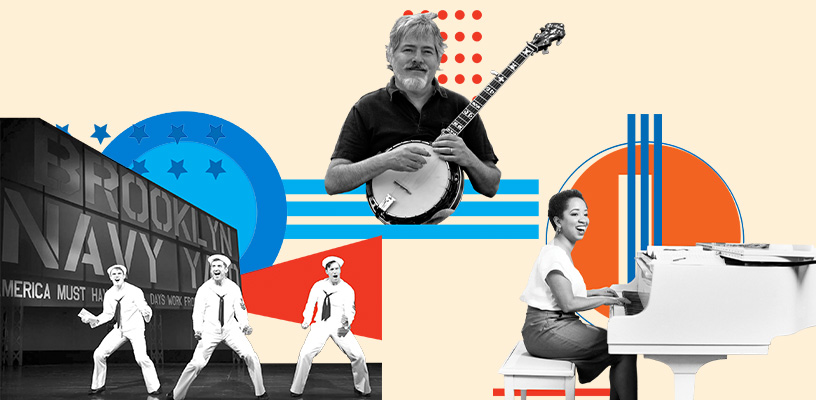America at 250: American Popular Music

Musicologist Matthew Mugmon writes a series of essays exploring American themes in classical music. Read about how American popular music styles such as jazz, bluegrass, rock, and musical theater served as inspiration for many leading composers such as Leonard Berntein, Steve Reich, Steven Mackey, and more.
Part of our spotlight on American composers ahead of the United States’s 250th birthday in 2026. Learn more at boosey.com/America250.
Jazz, bluegrass, and rock, as well as songs and scores for Broadway and the silver screen, are just some of the musical worlds that, for musicians and audiences alike, immediately signal a sense of American identity. Of course, these genres have also proliferated around the world in many varieties and forms over the last century. Many composers who grew up exposed to the rich culture of popular American music often reveal these influences in their compositions, drawing on music that feels elemental and formative to their musical identity.
The theater has offered composers one of the most fertile homes for incorporating vernacular sounds. Leonard Bernstein interfaced heavily with jazz and popular song for his musical On the Town, while his later MASS—a Vietnam-era reflection on the Roman liturgy that was composed for the inauguration of the Kennedy Center—features both rock and marching bands in its wide embrace of musical styles. David T. Little’s rock-infused chamber opera Soldier Songs for amplified baritone, septet, and tape is similarly wide-ranging in its musical influences, while investigating the perceptions and realities of being a soldier, through interviews with veterans in five recent American wars. Christopher Rouse’s deep love for and knowledge of rock music—he even taught on its history at the Eastman School of Music—is evident in Bonham (named for John Bonham, drummer for Led Zeppelin), a work for eight percussionists that Rouse called “an ode to rock drumming and drummers.”
Several composers are themselves active performers across genres, leading to a compelling merging of sound worlds. Individually and as collaborators, Béla Fleck (banjo) and Edgar Meyer (double bass) are celebrated virtuosos on their instruments and have compellingly blended jazz, bluegrass, and classical traditions in their multifaceted work as musicians. Fleck has composed several concertos for banjo and orchestra, including The Impostor, in which the banjo plays the self-conscious role of outsider, and Juno Concerto, named for Fleck’s son. And Meyer’s thrilling orchestral concertos include three for double bass, and two for violin.
Internationally acclaimed jazz musician Paquito D’Rivera is a proud advocate for bridging jazz and classical music. His wind quintet Aires Tropicales, for instance, calls on Cuban and Venezuelan dances as well as the memory of Dizzy Gillespie. Boundary-crossing jazz pianist and composer Courtney Bryan wrote the concerto House of Pianos as a “love letter to the many pianists who have inspired me over the years.” This inventive work imagines a dream-like space in which pianists of different eras and styles gather and rejoice in various rooms of a single house. Steven Mackey played electric guitar as a youth and has himself performed on the instrument in works such as Tuck and Roll, for electric guitar and orchestra, which incorporates aspects of the Delta blues.
An especially stunning stylistic blend of jazz and classical is found in Ned Rorem’s orchestral work Lions (A Dream), which has been recorded by the Branford Marsalis Quartet and North Carolina Symphony. Here, Rorem juxtaposes the mellifluous music of a jazz combo with the dissonant and often unforgiving sound of the orchestra—a stunning contrast that reveals one of many possible models for the fusing of American soundscapes.
Suggested Listening
> Click to listen on Spotify
LEONARD BERNSTEIN
On the Town
MASS
COURTNEY BRYAN
House of Pianos
PAQUITO D’RIVERA
Aires Tropicales
La Jicotea
BÉLA FLECK
Juno Concerto
DAVID T. LITTLE
Soldier Songs
STEVEN MACKEY
Tuck and Roll
Blue Notes & Other Clashes
EDGAR MEYER
Violin Concerto
NED ROREM
Lions (A Dream)
CHRISTOPHER ROUSE
Bonham
STEVE REICH
Electric Counterpoint
Radio Rewrite
—Matthew Mugmon, 2023
Matthew Mugmon is Associate Professor of Musicology at the University of Arizona. He has served as the New York Philharmonic’s Leonard Bernstein Scholar-in-Residence, and his research appears in the Journal of Musicology, Music & Letters, the Journal of Musicological Research, and the essay collection Rethinking Mahler. His monograph Aaron Copland and the American Legacy of Gustav Mahler was published in 2019 by the University of Rochester Press.
